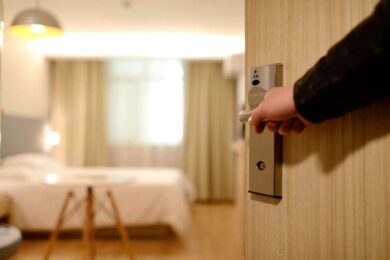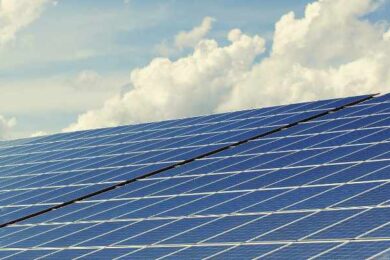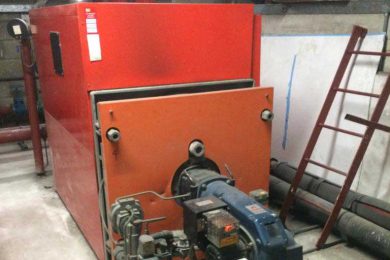The right heating and cooling system for your hotel can help improve customer satisfaction and save you money.
Find out the different types of heating and cooling systems, which one is best for you, and what to consider before you invest.
Types of HVAC in Hotels
There are several types of HVAC suitable for hotels. The type you get will depend on numerous factors including the size and location of your hotel.
Centralised systems
A central heating and cooling system will include internal and external units that are connected by ducts.
Most commercial buildings will use central heating systems because the heat or cooling can be distributed to certain areas of the building without heating or cooling everywhere.
This saves on money, but it also ensures customers are kept comfortable.
They are suitable for larger hotels and in colder climates.
Decentralised systems
A decentralised heating or cooling system will have individual units or split systems for each area or room.
They are suitable for smaller hotels and allow guests to have more control over the temperature in their room.
This type of system is generally less energy efficient compared to a centralised system.
Renewable energy solutions
This can include solar and geothermal systems. Solar thermal systems capture heat from the sun which provides hot water and heating. They can be used with other heating and cooling systems to reduce your energy bills.
Geothermal systems are underground pipes filled with fluid to collect heat from the ground and provide it to the building.
They are increasingly being used as a renewable heating system to be more eco-friendly which is not only important for climate change, but also your bills, and consumers increasingly prefer sustainable companies.
Hybrid systems
Hybrid systems combine different heating and cooling solutions to optimise energy efficiency.
You may decide on a centralized system for communal areas but a decentralized system for guest rooms to allow them control over the temperature for their comfort.
You may also decide on renewable solutions to combine with existing heating and cooling systems to help reduce your carbon footprint.
What to Consider when Choosing Hotel Heating & Cooling Solutions
Hotel size and layout
A larger hotel will obviously need to distribute heat and cooling to a larger area and so will need a system that is able to handle this such as a centralized heating and cooling system.
A smaller hotel or one with unique features that may not be able to have ducts may need a different solution such as a decentralized system.
Climate and location
If your hotel is in a colder or hotter climate, this will impact on the kind of heating and cooling system you need to consider.
In hotter climates, a more powerful system will be needed to keep the temperature comfortable.
Energy efficiency
All modern systems will have a good degree of energy efficiency; however, some are still better than others.
Generally, a centralized system is better than a decentralized system but also a renewable energy source could be even better again.
Energy efficiency helps you to meet sustainability targets, keep your costs down, and shows consumers that your business is concerned about its impact on the planet.
Cost
Budget will play a big factor in which heating and cooling system you choose.
While it can be a big investment, you must consider not only the purchasing of the system but the installation and operational costs.
One system may be more expensive than another but provide better long-term savings. Or you can integrate a system with your current one.
Recently we replaced the boilers in the prestigious Beetham Tower in Manchester to help increase energy efficiency without replacing the whole system.
Tips on energy efficient measures for hotel systems
It is important that your heating and cooling system is energy efficient but also that you practice energy efficient practices in general in your hotel.
Insulation and air sealing
Insulating and sealing any drafts will help to make your heating and cooling more efficient by stopping it escaping through gaps.
Checking your wall and roof insulation is adequate is important as well as checking windows and doors for any gaps that could be letting heat or cool air escape.
Regular maintenance
Your heating and cooling system will need regular maintenance to ensure it is running at its best and providing you with value for money.
Book for a regular service by a qualified heating and cooling engineer at least once a year.
A regular service of your heating and cooling system will help to avoid unexpected breakdowns, expensive repairs, and help your system to last longer.
Smart thermostats
Energy management systems and smart thermostats will help you to control and monitor your heating and cooling.
This can help you improve how you use your heating and cooling, save you money, and create a better environment for guests and staff.
Occupancy sensors
Occupancy sensors can be installed in guest rooms to automatically adjust heating and cooling.
They can adjust the temperature when the room is unoccupied to save on heating or cooling and save money.
Zoned heating and cooling
Zoned heating and cooling provide different temperatures to different areas of the hotel.
This means you can save energy by maintaining optimal temperatures in occupied spaces while reducing energy in low-usage areas.
Staff training
Training your staff about your heating and cooling system can allow them to see how they can directly help with reducing costs in the hotel.
When staff are properly trained, they will be able to understand and improve on the use of the system.
Monitoring your Hotel Temperature
Once your heating and cooling system is installed, it isn’t just a case of forgetting about it.
To ensure you are running as efficiently as possible, you must monitor your usage and see where it can be improved.
Natural ventilation
It is also important to have natural ventilation and passive design in your hotel. This can include the use of shading devices to help reduce your reliance on your system.
Heating and Cooling for Your Hotel
Investing in your heating and cooling system can help improve your sustainability, reduce your bills, and keep guests happy.
There are different types of systems you can choose from, and you can integrate these with your existing systems.
Your choice of heating and cooling system will depend on numerous factors including the size of your hotel, your budget, and your location.
There are also other things you can do to improve your energy efficiency and keep your costs down as well as invest in a heating and cooling system.
If you’d like to discuss how to improve your energy efficiency and reduce your hotels bills, contact us today.



